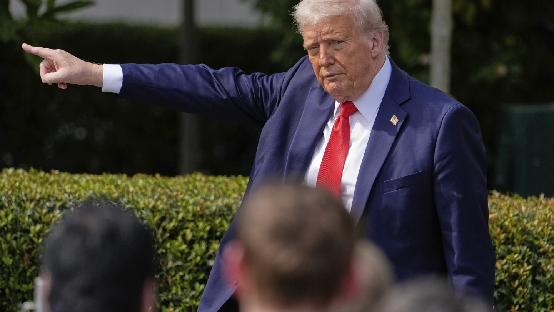
President Donald Trump said on Monday that he may temporarily waive tariffs he previously imposed on the industry to give automakers time to adjust their supply chains. Starting from April 3rd, the United States has imposed a 25% tariff on imported passenger cars, light trucks, and critical components, which he described as "permanent". This has also led to Audi, Jaguar Land Rover and other car companies suspending their exports of cars to the United States. General Motors and other companies are forced to adjust their supply chains to cope with rising costs. Car companies generally believe that the 25% tariff will have a "indiscriminate impact" on the global supply chain, and some companies have responded by suspending deliveries, raising prices, and laying off employees.
I am considering some things that can help some car companies, "Trump told reporters in the Oval Office. The Republican president stated that car manufacturers need time to shift production from Canada, Mexico, and other places. They need some time because they will be producing here, but they need some time. So I'm talking about something similar
Matt Blunt, Chairman of the US Automotive Policy Committee representing Ford, General Motors, and Stellantis Group, stated that the organization agrees with Trump's goal of increasing domestic production. He said, "People are increasingly realizing that imposing broad tariffs on components could undermine our common goal of building a thriving American automotive industry, and many of these supply chain transformations require time
Trump's statement implies another round of tariff reversal, as his tariff policies have caused panic in financial markets and sparked deep concerns among Wall Street economists about a possible economic recession. As he tries to limit the economic and political backlash that his policies may bring, his tough stance on trade issues is becoming increasingly blurred.
The Trump administration's proposal of "temporary exemption of car tariffs" is essentially a tactical adjustment of unilateralism strategy. By advocating for a 6-12 month supply chain adjustment window for car companies, it not only alleviates the cost pressure caused by high tariffs of 25% on local companies such as General Motors and Ford, but also sends a signal to the international community to "flexibly handle trade disputes", attempting to ease the alliance conflicts exacerbated by the tariff war. However, this "exemption" is not without cost - the United States still retains high tariffs on steel, aluminum products, and Chinese goods, and may require beneficiary countries to make concessions in areas such as energy procurement and industrial chain transfer. However, the scope of exemption, specific tax rate adjustment, and implementation duration of this exemption measure are not yet clear.
The temporary exemption directly boosted the stock prices of car companies, avoiding large-scale layoffs caused by supply chain disruptions, and giving car companies a lot of breathing space. At this time, Canada and Mexico are avoiding US tariff barriers through regional free trade agreements, while German car companies are accelerating the transfer of production lines to Southeast Asia to highlight the fragility of the US vision of "manufacturing return". Short term tariffs have been suspended or suppressed, but last week, the 125% tariff imposed on China has led to skyrocketing prices of electronic products and other daily necessities, and the burden of household expenses is still increasing.
Trump's tariff policy has also exposed the problems of the United States in the wave of globalization. Although tariffs have caused the United States to lose over 100000 manufacturing jobs, Trump still regards tariffs as a core tool to reshape the "America First" narrative. In response to Trump's tariffs, the European Union has introduced countermeasures and Japan has reduced its dependence on liquefied natural gas from the United States. This has also led to a rift between the United States and its allies, indicating that unilateral coercion is difficult to maintain the loyalty of traditional allies. At the same time, he has underestimated China's resilience. China is deepening trade cooperation with ASEAN, building a "de Americanized" supply chain network, and weakening the actual effect of the tariff war.
Looking at history, it has long been proven that beggar thy neighbor trade policies will eventually backfire. Currently, Germany and France are jointly promoting the establishment of an independent industrial system in Europe, and the BRICS countries are accelerating the construction of their own currency settlement mechanisms, both of which mark the irreversibility of a multipolar trade order. For China, it is necessary to continue to expand high-level opening up and hedge external risks with technological and institutional innovation in order to seize strategic initiative in the changing situation.

On the morning of December 29th local time, the precious metals market plummeted sharply after briefly breaking through the $80 per ounce mark.
On the morning of December 29th local time, the precious me…
According to the US media Barchart, recently, the fluctuati…
On December 29th, Mar-a-Lago in Florida, USA, witnessed a h…
SoftBank Group announced on Monday that it has agreed to ac…
Recently, the US State Department issued a visa ban, adding…
On January 20, 2025, just 13 days after taking office, Trum…